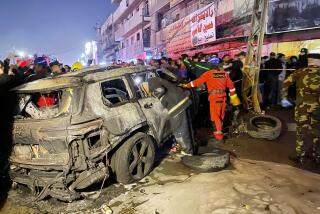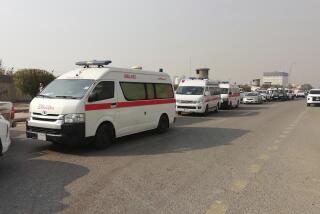Defense Official Is Killed; Truck Bomb Toll Put at 9
- Share via
BAGHDAD — Gunmen assassinated a Defense Ministry official as Iraq’s insurgency continued its campaign of targeting members of the interim government, Iraqi officials said Monday.
Issam Jassim Qassim, a director general in the ministry, was shot by three men in a white Opel car late Sunday near his home in the southwest Baghdad neighborhood of Saidiya, ministry spokesman Radhi Badir said.
Less than 12 hours later, a suicide truck bomb exploded outside a police station in the same neighborhood, killing nine people and wounding 56. One of the dead and 28 of the wounded were police.
Government officials and members of Iraq’s security forces have come under frequent attack from guerrillas, who consider them collaborators with U.S.-led forces.
On Saturday, Justice Minister Malik Dohan Hassan survived a car bomb attack on his convoy that killed two civilians and three bodyguards.
A provincial governor was killed last week. The director of cultural relations at the Education Ministry and Deputy Foreign Minister Bassam Salih Kubba were killed in June.
Bakhtiar Amin, the Iraqi minister of human rights, said there have been other attacks on government targets.
“They have attacked several of us,” he said. “They’ve attacked the Human Rights Ministry -- they shot at it from the outside, and they threw a violet flower that symbolizes death. Cars are following us and trying to cut off our convoy. They attacked the minister of labor and social affairs.
“It’s impossible to know who they are -- former regime loyalists or a terrorist group,” he said.
Security for government officials has been a high priority for the government of interim Prime Minister Iyad Allawi, even before the transfer of sovereignty from the U.S.-led occupation authority June 28.
All of Iraq’s 32 ministers are given a personal security detail of Iraqi policemen, but many choose to supplement it with security supplied by trusted relatives and tribal members. Below the level of minister, officials often are left relatively exposed.
Badir, the Defense Ministry spokesman, said Qassim did not have bodyguards.
“Some of them live in crowded areas, so they don’t want to act like a VIP and have guards,” he said. “Some of them refuse.”
Badir said he did not know whether Qassim had refused a government security detail. He said all of the Defense Ministry’s directors general -- reportedly 25 -- “will be provided with bodyguards soon.”
Members of Iraq’s security forces have also been targets for insurgent attacks.
Before the transfer of sovereignty, many police officers and members of the Iraqi National Guard expressed optimism that there would be fewer attacks and greater cooperation from citizens once they were less closely associated with U.S. forces.
But a visit to the Saidiya police station revealed a growing sense of frustration among the officers, with both the Iraqi government and U.S. military police who operate from the station.
An Iraqi first lieutenant sat looking out the broken window over the crater where a fuel truck exploded hours earlier. His shoes were off, his radio didn’t work, and, with most of the station’s vehicles damaged in the blast Monday morning, there didn’t seem to be much to do.
No senior Iraqi official had visited the site.
A team of U.S. 1st Cavalry Division soldiers was there, overseeing the replacement of the low brick wall around the station parking lot with concrete slabs.
The Iraqi police officer, who declined to give his name, was grateful for the quick response of the U.S. soldiers.
“The Americans reacted better than our own government. I’m against the occupation, but they responded as if this was their own base,” he said.
But his gratitude to the Americans had limits. U.S. military police operate almost daily from the station at the request of the Interior Ministry. The lieutenant said he didn’t want them there. The superiority of their weapons and training is undisputed, he said, but their presence “gives people a reason to attack us.”
More to Read
Sign up for Essential California
The most important California stories and recommendations in your inbox every morning.
You may occasionally receive promotional content from the Los Angeles Times.













